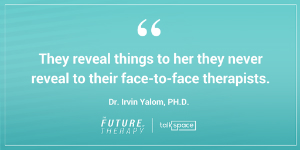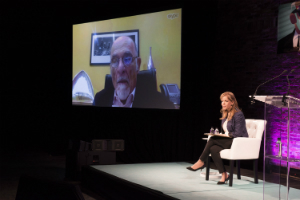Because therapist Irvin Yalom has practiced psychotherapy for more than six decades, he has witnessed and played a role in the evolution of therapy.
Dr. Yalom is the professor emeritus of psychiatry at Stanford University, a renowned existential psychotherapist, the author of bestselling novels and psychology books, and one of Talkspace’s clinical advisors (he works closely with our head of clinical development, Nicole Amesbury).
He delivered the keynote address at our clinical conference, The Future of Therapy. Yalom told the story of his career in psychotherapy and how he watched the profession transform through several stages.
The Near-Death Experience that Made Dr. Yalom a Psychologist
When Yalom was 14, his father had a coronary. He seemed close to death.
Doctors still made home visits during Yalom’s childhood, so he and his mother were stuck waiting rather than being able to rush his father to the hospital. Meanwhile, Yalom’s mother blamed her son for the illness.
“You killed him,” she yelled.
As Yalom wished the accusations would stop, the doctor arrived and began treating his father. He tousled Yalom’s hair and encouraged him to borrow a stethoscope to listen to his father’s heart.
Yalom appreciated the relief, and the doctor inspired him to pursue a career in medicine. He saw it as a way to pass on that healing.
While waiting to become old enough to attend medical school, Yalom fell in love with literature and philosophy, particularly the works of Leo Tolstoy and Fyodor Dostoyevsky. To combine his love of medicine with the psychology and philosophy authors such as Tolstoy presented, Yalom became a psychiatrist.
Moving from Psychoanalysis to Existential Psychology
Yalom studied psychoanalysis at Johns Hopkins University and trained with a psychoanalyst who used a traditional approach. After spending 700 hours lying on her couch receiving psychotherapy sessions, Yalom had learned the deficiencies of traditional psychoanalysis. He believed it needed a more personal approach.
“It was a costly lesson in a way, but I thought that there’s got to be a better model than that, so I began relating much more personally,” Yalom said. “I began disclosing more of myself to patients.”
After reading the work of existential psychologist Rollo May, Yalom realized he could further improve his practice by integrating the ideas of eastern and western philosophers such as Satre, Camus, Kafka and Nietzsche.
Yalom believed death was an important existential issue that caused anxiety for many clients. To work with people who already had death on their minds, Yalom saw patients who had been diagnosed with cancer. He then realized these issues went beyond terminal illness and into common problems such as the nature of life, retirement and losing loved ones.
To build a framework for developing his existential psychology, Yalom proposed four “givens” [existential problems all people deal with]: isolation, meaninglessness, mortality and freedom. Yalom fully explores this in his book, “Existential Psychotherapy.”
Witnessing the Evolution of Psychotherapy
As Yalom practiced psychotherapy throughout the decades, he noticed shifts in the field and how they related to his career. Here are a few of the major changes he discussed in his speech:
The Fluctuation of Storytelling in Medicine and Psychology
Doctors and researchers often become lost in numbers, lab results and diagnoses rather than thinking about people. As a professor at Stanford, Yalom has consistently stressed the value of storytelling and focusing on individuals. He has recently seen a resurgence in case studies that consider the patient’s story, not only the symptoms and numbers.
Therapy Has Gone Beyond Psychiatry
Because psychotherapy began with Freud, a psychiatrist, only psychiatrists practiced therapy during its early stages. A psychologist could only practice psychotherapy if a psychiatrist supervised him or her. This changed with the rise of humanistic approaches such as that of Carl Rogers.
Connecting with Talkspace and the Change of Heart on Online Therapy
aBefore connecting with Talkspace, Yalom had a client who wanted to continue seeing him despite moving far away and to a remote location without access to therapy. Yalom was reluctant to try online therapy, but he found Skyping with her to be effective.

This made him open to the text-based approach and other mediums Talkspace offers. As he connected with Talkspace and began working with Head of Clinical Development Nicole Amesbury, Yalom observed several merits of the platform:
- Clients open up more quickly and sometimes reveal things they admit they would never reveal to a therapist in person
- More people can access therapy because of Talkspace
- The text format makes supervision easier and efficient
Dr. Yalom’s Vision for the Future of Therapy
Yalom believes psychotherapy will exist forever. The modalities and integrations with medicine will change, but the essence of helping clients is eternal.
He may be in this eighties, but Yalom’s story and contributions to psychotherapy are far from finished.
Talkspace articles are written by experienced mental health-wellness contributors; they are grounded in scientific research and evidence-based practices. Articles are extensively reviewed by our team of clinical experts (therapists and psychiatrists of various specialties) to ensure content is accurate and on par with current industry standards.
Our goal at Talkspace is to provide the most up-to-date, valuable, and objective information on mental health-related topics in order to help readers make informed decisions.
Articles contain trusted third-party sources that are either directly linked to in the text or listed at the bottom to take readers directly to the source.





